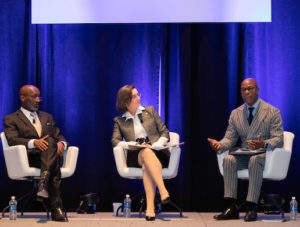Who is a member?
Our members are the local governments of Massachusetts and their elected and appointed leadership.

Marc Ott (left), CEO and executive director of the International City/County Management Association, MMA President Jill Hai (center), and Clarence Anthony, CEO and executive director of the National League of Cities, talk about DEI issues at the MMA Annual Meeting & Trade Show’s closing session on Jan. 21.
For the vision of diversity, equity and inclusion to become a reality, municipal leaders must approach the objective with data, collaboration, funding and — most of all — strong leadership and commitment.
This was the message from two national DEI leaders — National League of Cities CEO and Executive Director Clarence Anthony and International City/County Management Association CEO and Executive Director Marc Ott — to local officials during the Closing Session of the MMA’s Annual Meeting & Trade Show on Jan. 21.
Anthony and Ott sat with MMA President Jill Hai for a discussion about DEI work at the municipal level, and about their experiences as Black leaders confronting these issues. Both leaders said that communities must prioritize DEI work, even as they grapple with other complex, and expensive, challenges.
“The most challenging part is you’ve got police issues, you’ve got fire, you’ve got housing, environmental issues, potholes, transportation,” Anthony said. “[Leaders say,] ‘I don’t have money for diversity, equity and inclusion,’ and that’s disappointing … I would encourage every city, town and village in America — if you’re going to really be in it, you’ve got to fund it.”
When Ott arrived in Austin, Texas, where he served as city manager for almost nine years, he quickly learned that the city’s progressive reputation covered over a long history of racial inequality. In particular, he discovered that 1920s-era policy decisions had confined Black residents to the city’s east side and separated them by a highway, with ramifications lingering decades later. In response, he began redirecting surplus capital funds to the east side, to address the historical underinvestment there.
“I’m the city manager, for goodness sake — I can do something about that,” Ott said. “And so I started finding ways. Because when you’re in these positions, you not only have formal authority and power, you have discretionary authority and power. We need to be brave enough at times to use it, to do the right thing.”
Shortly after taking over as mayor of South Bay, Florida, a job he held for 24 years, Anthony was reviewing the city’s park systems plan and noticed that the park in one area closed at 11 p.m., while another park closed at 5 p.m. He learned that city policies contained many similar disparities.
“I said, ‘I want to review every one of those policies,’” Anthony said.
He urged leaders to remember constituents who aren’t in the room when decisions are made.
Anthony said he often finds it painful to discuss race as a Black man in America. When he first took over at the NLC in 2013, he hesitated at first to raise the issue, for fear of being stereotyped. But he did confront it, he said, and the NLC created the Race, Equity and Leadership program, or REAL, to help build more equitable communities. He said every leader has a responsibility to step up on this issue.
“I know that some of you who are in this room, you don’t want to deal with it either,” Anthony said. “You don’t necessarily want to have to face some of the historical inequities and challenges that have been in America, are in America, and are still showing up in communities throughout America. … I want to acknowledge that, and say to you that leadership isn’t easy, and the responsibility to lead around diversity, equity and inclusion is not easy.”
That leadership must involve not only words but money. Charlottesville, Virginia, for instance, has committed $4 million to efforts to address redevelopment, provide scholarships to low-income residents, and recognize local African-American history, Anthony said. In Austin, Ott said, quality-of-life reports examining conditions for various demographic groups have factored heavily in the city’s budgeting process.
Communities can also undertake smaller efforts to change the messages they’re sending about inclusion, said Ott, who came to the ICMA in 2016 after holding municipal management positions in Texas and Michigan. In Glendale, Arizona, officials changed their marketing materials after realizing that their photos of city services depicted white people, he said, despite the fact that the city is fairly diverse.
Overall, Anthony said, officials need to embrace “data, data, data.” To create equitable policies, he said, officials must understand where poverty exists, and where that intersects with racial demographics. Which groups have the highest unemployment, the lowest educational levels, the lowest levels of home ownership, and the least representation in business ownership and in contracts that get awarded?
“Start with knowing the issues, knowing the data,” Anthony said.
Both leaders emphasized that communities won’t succeed if they hire a single equity officer and abandon them to work in isolation, or if they expect the lone person of color on a council or board to be the only one to address racial issues. For DEI work to progress, they said, all parts of the municipality must engage in the effort.
“One person alone cannot, cannot, cannot do that job,” Ott said.
Following the 2020 police killing of George Floyd, Ott said, he has seen more widespread support for systemic and structural change.
“We have the opportunity to make extraordinary change, and so we have to seize it,” Ott said. “It’s not easy. It’s going to be hard. But the greatest things that have occurred in our country have not been easy — they’ve been hard. But we’ve always done them, and we can do this, too.”
DEI resources for municipal leaders can be found on both the ICMA website and the NLC website.